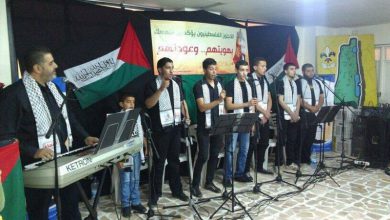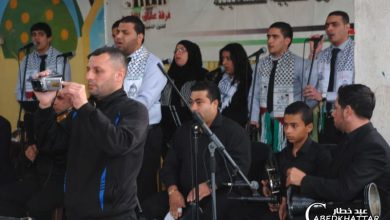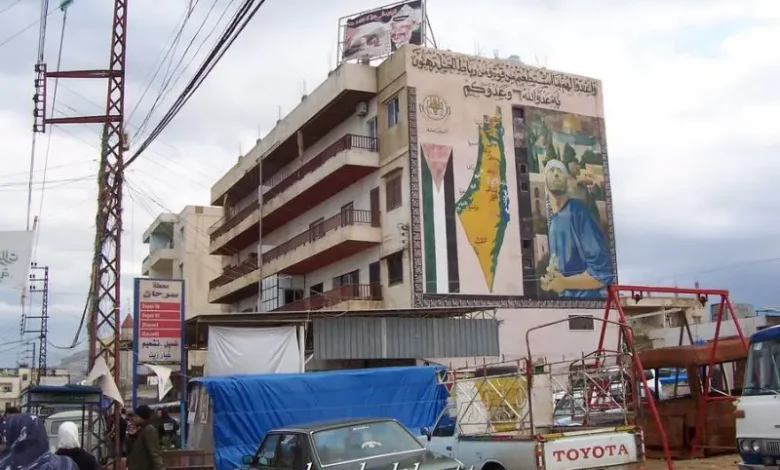
An unsustainable situation in Baddawi
An unsustainable situation in Baddawi
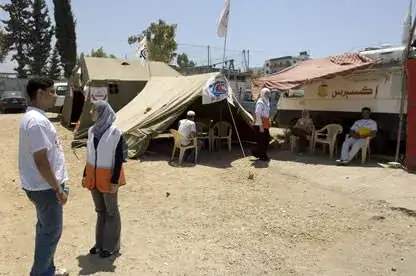
The first shock on entering the Baddawi Palestinian refugee camp in northern Tripoli is the laxed security measures in place. Instead of being drilled with questions, frisked and having the car inspected for weapons or explosives, a smiley Fatah party member, Kalashnikov in hand, waves you in with a friendly “tfadalo”.
The camp is mayhem: a mire of wires and hanging cables, dusty roads, narrow alleys, disheveled buildings, children loitering in the streets and truckloads of vehicles marked with different relief agency stickers. Barefooted pedestrians scurry up and down the main road, carrying bags or haggling over food and aid boxes, prized possessions these days.
The entrance to one of two main UNWRA distribution centers is packed with fatigued displaced families awaiting their aid rations. Inside the makeshift warehouse, stacks of boxes, empty plastic water containers, bottled water packs, foam mattresses, bagged up kitchen sets and food boxes fill up two rooms. A young UNWRA representative, wearing a blue UN vest, stands outside the door, reviewing blue or white cards handed over by the anticipating crowds and discussing terms for the receipt of food and non-food parcels.
A few meters down the congested street, large numbers of women, with toddlers and children in tow, queue outside several clothes and shoe stores that bear the logos of MPDL, Nabaa and ECHO on the windows.
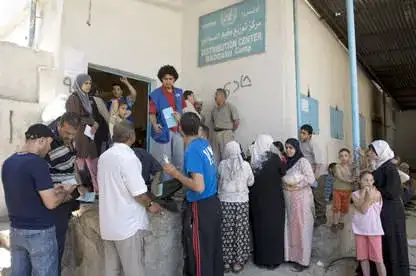
Inside the shops, men, women and children sift quickly through racks, shelves and boxes picking various clothes items and handing over blue coupons to the storekeeper. Once the inventory of their possessions has been recorded onto a long list, they sign off their names and exchange a blue coupon for a white one, indicating that they’ve been assisted. Two local NGO Nabaa volunteers stand guard in each store to oversee the process and survey the beneficiaries.
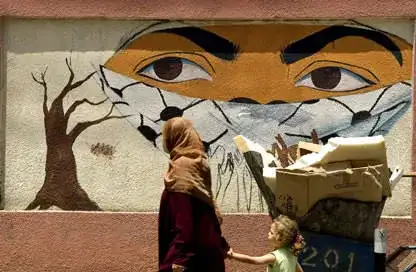
“It’s important for us to monitor the quality of the items and to interview each family after they’ve received their assistance to ensure that they’re satisfied as well as to appraise any additional needs they have. Psychologically, this is very critical to them (beneficiaries) as it shows them we care and it helps us to keep tabs on them and do the necessary follow up, “explains Jasser Dawoud, Naba’a’s leader.
He is persistently stopped by Palestinian IDPs (internally displaced persons) along the streets, demanding help or asking him questions about the kind of assistance they’re entitled to. One woman outside one of the stores complains that UNWRA has not given her any assistance because she doesn’t have her refugee card. Everyone seems to know him and his compassion, fervor to help and patience are admirable.
“It’s an unsustainable situation and what we’ve noticed each passing day is that the frustration and anger of these people is on the rise. For example, the first couple of days, the distribution process was done in an orderly manner; but suddenly, the queues of people swelled from 50 to 300 people in a matter of seconds, causing disputes and fights between them and anger towards the relief workers,” says Alberto Bocanegra, MPDL’s representative (Movement for Peace, Disarmament and Liberty) as he describes moments of tension endured at the distribution centers, which have been operating non-stop from 7 am to 1am on a daily basis since the exodus began.
MPDL, a Spanish NGO that has been working with Palestinian refugees in Lebanon since 1997, was recently implementing a psychosocial program for kids traumatized by last year’s war in areas of the south.
In response to this recent emergency, MPDL has acted quickly by distributing hygiene kits (containing shampoo, toothpaste, detergents, disinfectants, towels, diapers and sanitary pads) and coupons worth $50 for the purchase of clothes (up to $40) and shoes (up to $10) for Palestinian IDP families from Nahr al Bared that are being sheltered in Baddawi.
Their project, worth 160,000 Euros financed by ECHO (European Commission Humanitarian Organization), is done in cooperation with the local NGO Developmental Action without Borders (Naba’a).
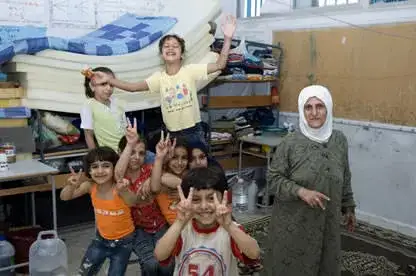
Most families were forced to flee from their bombed out houses or burning buildings in the middle of the night or during the frail ceasefires from Nahr-al Bared over two weeks ago. They arrived by foot, on bicycles or crowded cars and pick-up trucks wearing only their pajamas or one set of clothes. Apparently, adolescent girls cramped into makeshift shelters or with host families refused to exit their rooms during the first days because their clothes were dirty and they were unable to shower or wash.
Through its initiative, MPDL is also helping to boost the local economy. It enables small-scale retail shop owners to raise an income, making a modest profit (about 1,000 LL per item sold), and to simultaneously feel good about helping their compatriots. A storeowner in one of the five stores sub-contracted by MPDL says that in the last week he’s dispatched 500 families at an average of 50 to 70 per day. To date, MPDL/Nabaa have jointly assisted 2,000 families out of the 2,500 planned under this intervention.
UNWRA claims that approximately 3,000 – 5,000 Palestinian refugees remain trapped inside Nahr al Bared, and although data is not yet conclusive, several agencies and political parties estimate that 1,500 – 3,000 dwellings are totally or partially destroyed inside the settlement as a result of the cross-fire between the Lebanese Army and Fatah al Islam radicals.
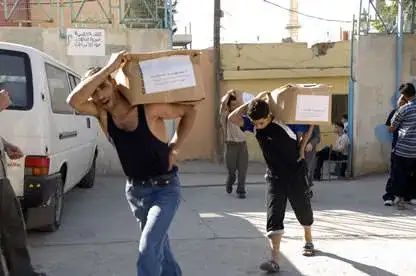
“We’re now in the midst of putting together proposals to assist the possible return of families (to Nahr-al Bared). But the problem is that three days ago we could not foresee the camp being transformed into a Grozny-like scenario,” adds Mr. Bocanegra. “We’re told that approximately 20% of the bombs have not exploded and that the camp has been turned into a minefield. Which means that firstly, a de-mining team will have to go inside, then the Red Cross/Crescent societies will have to remove the decomposing bodies; and then, the debris and rubble clean up operations can begin, which will take some time.”
This week, UNWRA has launched an appeal to the international community requesting 12.7 million dollars for a 90-day period to provide immediate assistance to the refugees. But, for the moment, in the coordination meetings being held twice and even four times a day inside Baddawi camp, where all relevant agencies (UNWRA, the various Palestinian political factions and local/international NGOs) discuss on-going interventions, in an effort to avoid duplication and respond to growing needs, the onus is on the crisis at hand, not on post-emergency or return/reconstruction efforts.
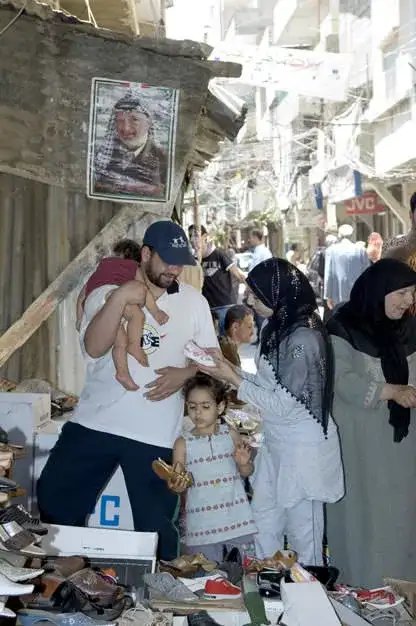
“We are distributing medicines to treat chronic diseases (such as kidney, heart, respiratory and psychological ailments) and enriched milk for 1,000 babies and pregnant women,” says Egido Sanz Rincon, country coordinator for Solidarity International (SI), another Spanish NGO working in Lebanon that has swiftly responded to the IDP crisis in Baddawi. SI works via two local NGOs, NAMSK and PARD with funds provided by the Spanish Basque government.
Ms. Sanz explains that they’ve noticed that many mothers and pregnant women are suffering form breast-feeding problems, anemia and miscarriages, caused by the trauma and stress.
“Plus, we are seeing an alarming increase in allergies, chicken pox, fleas, skin diseases and scabies,” she adds, highlighting the extreme lack of hygiene and sanitary conditions inside the crowded camp. SI’s work, through NAMSK’s medical center and PARD’s emergency health post is treating patients, prescribing medicines and ministering first aid cures as complimentary efforts to UNWRA and the Red Cross’s mandate.
“I’m very hot during the day and cold in the evenings because we don’t have enough blankets. But, worst of all is that I haven’t been able to take a shower for days,” says Nadia, 24, as she balances her 3-year old daughter Ammal on her left hip. Nadia arrived at Baddawi camp 14 days ago in a Red Cross ambulance. She’s nine months pregnant, due any day, and she plans to call her expecting son Ashi’aa (sunray).
The Baddawi camp, established by UNWRA in 1955, has swollen from 16,000 residents to an estimated 37,000 in less than three weeks (according to UNWRA sources) and has transformed its schools, mosques, private homes, UNWRA and local NGO offices into massive collective centers.
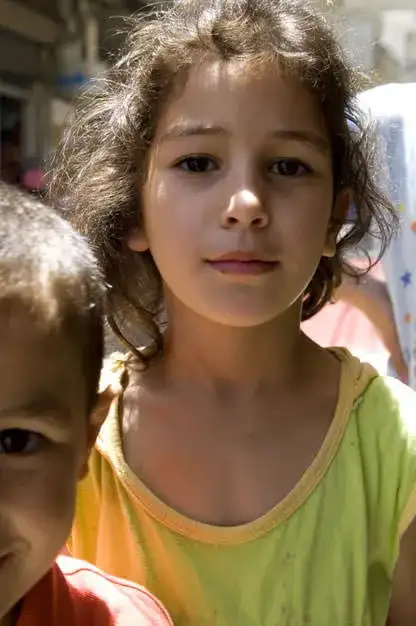
Nassra School, one of five being used as an IDP shelter, is where Nadia stays along with 200 families (approximately 1,000 persons) without hot water and forced to share 4 bathrooms and 3 latrines. At night, women and children sleep inside the jam-packed classrooms sharing mattresses (1 for every 2 persons) and the men fill up the corridors.
“I’m thankful to Ala because we’re all together, except for my brother who’s still caught up at Nahr-al Bared,” says Feryal Hanat Sabeine, 47 years old and a mother of eight.
“But we’re fed up with rice, and we need washing machines,” she says as she divides today’s portion of rice into various plates for her husband and kindred. Feryal and her family share a 30-meter square classroom with 20 persons, two other families. A blue plastic curtain divides the premise into two sections, attempting for a little privacy between the co-habiting families.
With glassy eyes, Feryal describes her family’s ordeal as they fled on May 22nd, after a bomb devastated the 2nd floor of their home, “we walked for about 1 km, avoiding snipers, until we reached the first Lebanese army checkpoint and then the soldiers helped us to get a taxi that brought us to the camp.”
She apologizes for not being able to offer any coffee or sweets (a humbling gesture) and proceeds to explain that the first days UNWRA fed them sandwiches and Lebanese bread with labne. But for the past week they’ve been receiving hot meals of only coooked rice with chicken or meat, from local restaurants contracted by various political parties. They would prefer a more varied diet, of fresh vegetables and fruit. But caseworkers say that for the time being, fresh food cannot be properly washed or stored in the public shelters.
Her husband, a seasonal construction worker, says that until the fighting broke out
between Fatah al Islam and the Lebanese Army he was working in areas of Tripoli. But now he’s afraid to leave the camp in fear that the Lebanese army will arrest him, on suspicion that he might be a member of the radical group.
The Sabeine are thankful for the mattresses, the clothes and hygiene products they’ve received form the various humanitarian agencies. They’re biggest concern and hope, one that is echoed by many IDPs throughout the day, is to be able to return soon to their homes in Nahr al Bared, and eventually, to Safaar (their home town) in Palestine.
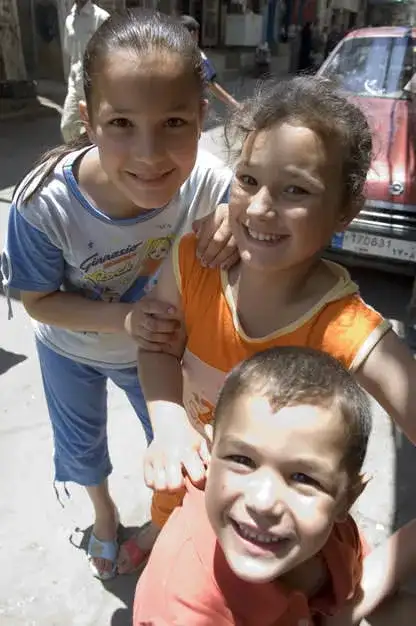
By Tina Wolfe,
Ya Libnan Volunteer
Photos by David Xavier

